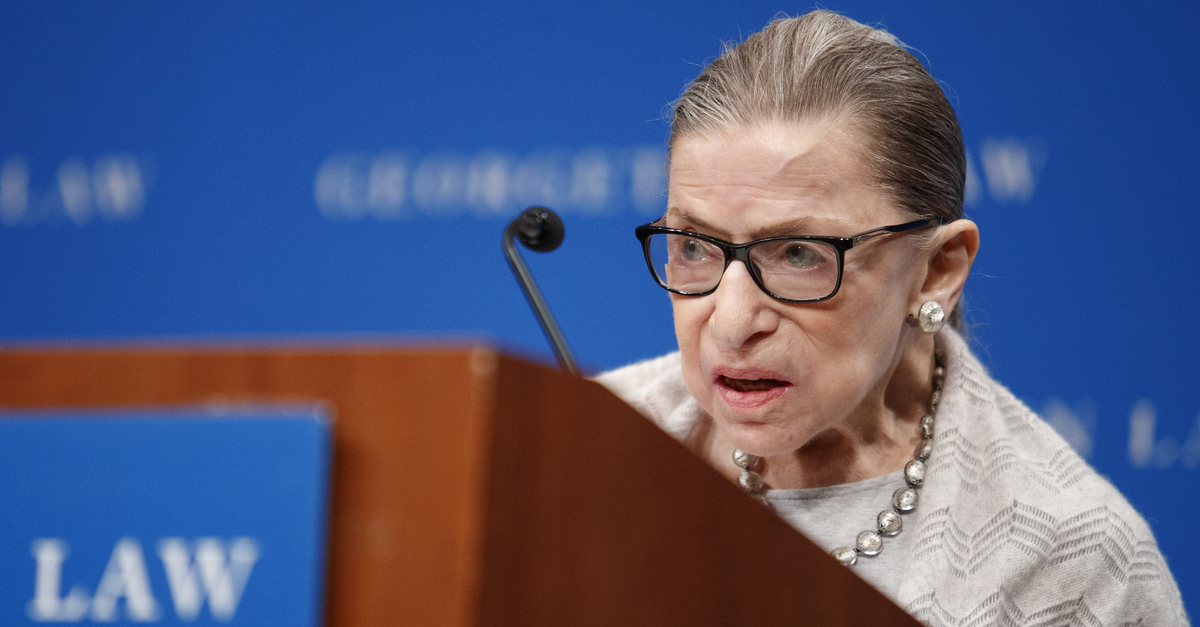
Ed Whelan, a prominent figure in the conservative judicial activism movement, offered a likely preview of Republican strategy in the event that Supreme Court Justice Ruth Bader Ginsburg passes away during the 2020 presidential election. In short: Whelan argued that Senate Republicans would quickly move to fill any empty seat.
On Friday, the New York Times published a heavily sighed-at column authored by their lead Washington reporter Carl Hulse: “Why Republicans Will Sidestep Their Garland Rule for the Court in 2020.”
The column’s introduction was repeatedly panned on Twitter:
When Justice Ruth Bader Ginsburg was released from the hospital last weekend after another in a string of health scares, blue America breathed a sigh of relief. Only one more month, many whispered, until the start of a presidential election year when filling a vacancy on the Supreme Court would be off limits in the Senate.
But would it?
The notion that Senate Majority Leader Mitch McConnell (R-Ky.) would abide by his own precedent for denying a Supreme Court nominee an up-or-down vote during a presidential election year has always been seen askance–if not outright ridiculed. Liberals, leftists and others who were miffed at McConnell’s denial of a vote for Chief Circuit Judge Merrick Garland have long believed the McConnell Doctrine would have a corollary supplied by McConnell himself–should the opportunity of a dead Democrat-appointed justice arise.
McConnell’s critics view the so-called “Garland Rule” as something not entirely unlike ginned up pretext–maybe a source of consternation at best. The premise that Senate Republicans might act with consistency or principles when power beckons is essentially viewed as not worthy of serious consideration by many high court watchers. Nevertheless, the column was written and later shared by Pennsylvania attorney Howard Bashman on Friday afternoon.
The president of the Ethics and Public Policy Center took issue with the Hulse column’s basic thesis–alleging it was actually Democrats who have acted unscrupulously on the subject of filling Supreme Court seats during presidential election years.
“Oh, you mean the *Biden rule* from 1992 (also embraced by Schumer/Reid in 2007 and 2008) that applies only when president and Senate majority are of opposite parties?” Whelan tweeted.
“Funny how Left (1) concocts claim that Biden rule applies in election years when president and Senate are of *same* party, and (2) forgets its own 2016 argument (bonkers, to be sure) that Senate is constitutionally obligated to hold an up-or-down vote on a #SCOTUS nominee,” Whelan later added.
The so-called “Biden rule” refers to comments made by then-senator Joe Biden in 1992 during a floor speech in which he implored then-president George H.W. Bush to delay a hypothetical Supreme Court vacancy “that would occur in the full throes of an election year.”
“Some will criticize such a decision and say that it was nothing more than an attempt to save a seat on the court in hopes that a Democrat will be permitted to fill it, but that would not be our intention,” Biden said. “It would be our pragmatic conclusion that once the political season is underway, and it is, action on a Supreme Court nomination must be put off until after the election campaign is over.”
Invocation of Biden’s words were used by Senate Republicans to throttle the Garland candidacy in its infancy. Biden himself weakly protested that his floor speech was taken out of context and noted how he had also floated the idea of a “moderate” compromise candidate being named under such circumstances.
Whelan is largely known for his conspiracy theory that Christine Blasey Ford had mistakenly identified Brett Kavanaugh as the man who sexually assaulted her in 1982.
Though much-derided at the time due to Whelan’s use of Zillow home listings to attempt to prove his case, the “mistaken identity” theory was eventually adopted in lesser form by many of Kavanaugh’s defenders who were loathe to call Ford a liar.
President Donald Trump himself endorsed the Whelan-sourced theory. As did Senators Susan Collins (R-Maine), Lindsey Graham (R-S.C.) and Joe Manchin (D-W.Va.).
As such, Whelan’s posture on a potential open Supreme Court seat offers a window into the heart of elite GOP thinking on the matter.
[image via Tom Brenner/Getty Images]